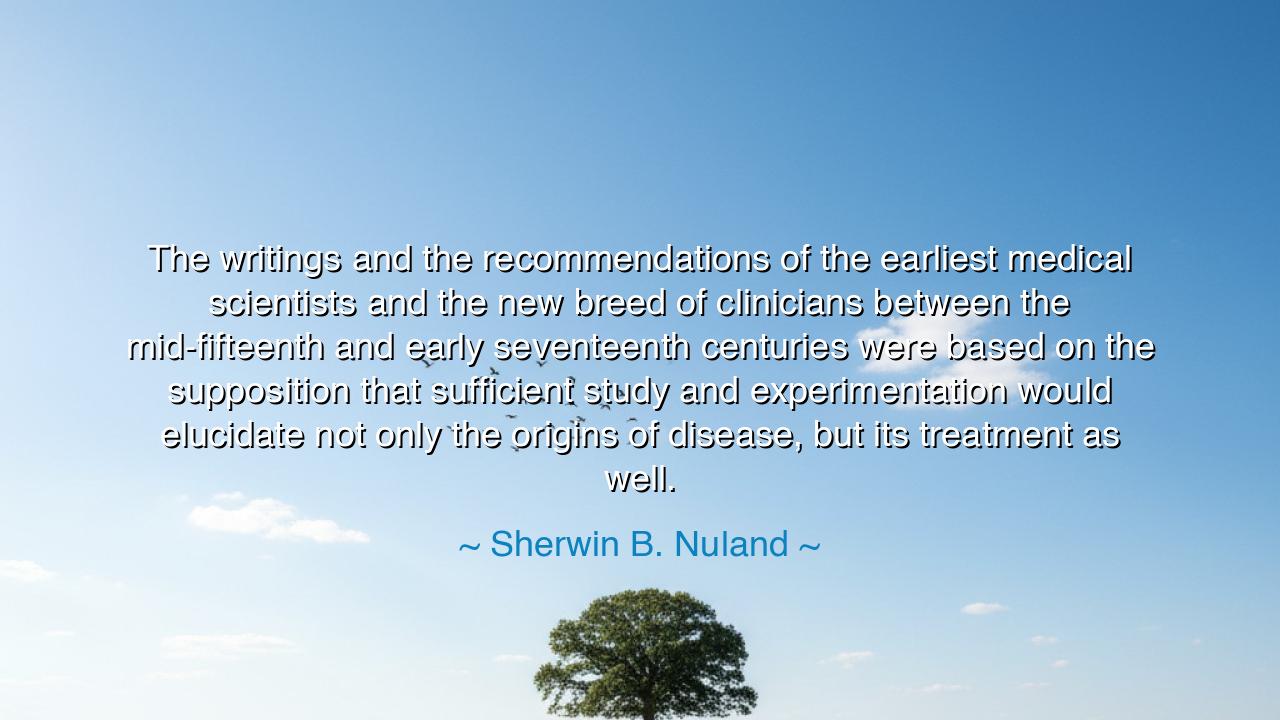
The writings and the recommendations of the earliest medical
The writings and the recommendations of the earliest medical scientists and the new breed of clinicians between the mid-fifteenth and early seventeenth centuries were based on the supposition that sufficient study and experimentation would elucidate not only the origins of disease, but its treatment as well.






When Sherwin B. Nuland declared, “The writings and the recommendations of the earliest medical scientists and the new breed of clinicians between the mid-fifteenth and early seventeenth centuries were based on the supposition that sufficient study and experimentation would elucidate not only the origins of disease, but its treatment as well,” he cast light on one of humanity’s greatest turning points. His words summon us to remember a moment when the dark veil of ignorance began to lift, when mankind dared to believe that through reason and persistence, even the secrets of suffering could be unveiled. It was not merely a scientific revolution; it was a rebirth of courage, where hope replaced resignation, and inquiry replaced superstition.
For countless generations, men and women lived under the tyranny of disease, trembling before plagues they could not name, bleeding under fevers they could not cure. The ancients sought remedies in herbs, charms, and prayers, often guided more by faith than by knowledge. Yet, in the crucible of the Renaissance, a new fire was lit. The medical scientists and clinicians of that era, though still children of their time, planted the seed of a great transformation: the belief that with sufficient study and experimentation, the mysteries of the flesh could be deciphered. This faith in human reason became the spear with which they pierced the darkness.
Consider Andreas Vesalius, who in 1543 published De humani corporis fabrica. With steady hands and fearless spirit, he cut open the veil of the human form, overturning centuries of reliance on Galen’s teachings. Where others repeated errors out of reverence, Vesalius chose experimentation, laying his eyes directly upon the truth. In his work resounds Nuland’s insight: that the path to healing lies not in speculation alone, but in rigorous study and bold encounter with reality. Vesalius embodied the Renaissance spirit — to question, to test, to observe, and thus to rise.
So too did William Harvey, in the early seventeenth century, when he unveiled the circulation of blood. For centuries, physicians had spoken with confidence yet in error; Harvey, through relentless study and patient experimentation, uncovered the rhythm of the body itself. He proved that knowledge is not the inheritance of blind tradition, but the reward of observation and perseverance. His work gave new hope: if the origins of disease could be found in the patterns of the body, then surely its treatment might also be within reach.
Nuland’s words remind us that this was more than an academic pursuit — it was a moral revolution. To believe that suffering could be understood was to affirm that man was not forever cursed, but destined for healing. The writings of those physicians were more than ink upon parchment; they were torches in the night, handed from one generation to the next. Each recommendation, each treatise, each tentative conclusion, became a stone in the bridge from despair to hope, from helplessness to healing.
What, then, is the lesson for us who live in an age of mighty hospitals, vaccines, and machines that peer into the very fabric of cells? It is that progress is not born of comfort, but of restless seeking. The courage of Vesalius and Harvey must live in us still — in our willingness to question, to test, to learn. We must not bow before ignorance or superstition, whether in medicine or in life’s greater struggles. Instead, we must take up the discipline of study, the humility of experimentation, and the faith that truth, once uncovered, brings deliverance.
Practical actions lie before us all. Let us read widely, for writings carry the seeds of wisdom. Let us test ideas in the crucible of experience, for untested faith is brittle. Let us question the traditions that no longer serve, yet honor the courage of those who came before. In our health, let us not be passive but active participants — seeking understanding of our own bodies, trusting in science, but also remembering that every cure was once only a question.
Thus may Nuland’s words echo across the ages: through study and experimentation, humanity tore away the shadows and stepped into the dawn. Let this be our inheritance — to seek, to learn, and to heal, until ignorance yields at last to truth, and suffering bends before the wisdom of perseverance.






AAdministratorAdministrator
Welcome, honored guests. Please leave a comment, we will respond soon